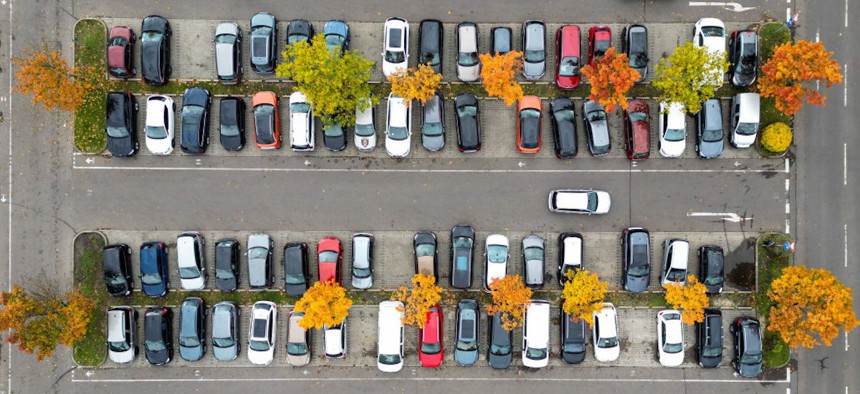Connecting state and local government leaders
Less parking could pave the way for denser housing and more accessible public transportation.
This story is republished from Grist. Read the original article, which was supported by the Economic Hardship Reporting Project.
In the beginning, parking lots were created to curb chaos on the road. But climate change has turned that dynamic on its head.
Since the 1920s a little-known policy called parking minimums has shaped a large facet of American life. In major cities, this meant that any type of building — apartments, banks, or shopping malls — needed to reserve a certain amount of parking spaces to accommodate anyone who might visit.
But transportation makes up almost one-third of carbon emissions in the U.S. and cars represent a significant portion of those emissions. As the country attempts to aggressively cut carbon emissions, reducing dependence on fossil fuels will also mean rethinking what transportation and public space look like, especially in cities.
Earlier this month, the city of Austin, Texas, became the latest community to eliminate parking minimums and is now the largest city in the U.S. to do so.
“If we want half of all trips to be in something other than a car, then we can’t, as a city, in my opinion, mandate that every home or business have at least one parking space for each resident or customer,” said Zohaib Qadri, the Austin city council member who introduced the measure.
Reducing dependency on cars was a huge push for the initiative in Austin, said Qadri, who hopes the measure also will lead to a more sustainable city.
“Climate change is here,” said Qadri. “And we’re only going to make it worse by clinging to these very climate unfriendly and unsustainable transportation habits of the 20th century.”
The elimination of this seemingly innocuous law could pave the way for cities to build denser housing, increase public transit options, and reduce their carbon emissions, according to Donald Shoup, an engineer and professor of urban planning at UCLA.
“It isn’t just the housing crisis and climate change, it’s traffic congestion, it’s local air pollution, it’s the high price of everything — except parking,” said Shoup.
Climate change and air pollution are particularly costly outcomes, with both estimated to cost the U.S. billions of dollars every year. Parking spots, meanwhile, can run in the tens of thousands of dollars to construct, with one estimate putting that figure at almost $30,000 per spot.
“Even if climate change were not an issue, removing parking requirements is a good idea. But in addition to being a good idea locally, it will help the entire planet,” he said.
Momentum is building with cities like Anchorage, Richmond, and Raleigh, and states like California all eliminating their parking minimums within the last few years.
Paved parking lots not only take up valuable space, but also contribute to the urban heat island effect, where cities often experience higher temperatures than their rural counterparts. The asphalt and concrete used to construct parking lots often absorb and re-emit heat at higher rates than the natural environment. This happened amidst a record-breakingly hot summer which means that not only are parking lots contributing to the larger problem of climate change, but they also make the outcome worse in the short-term as well.
An important caveat is that undoing parking minimums does not mean that all parking will vanish overnight, but rather that any off-street parking built will not need to adhere to any minimum standard. These standards were not only outdated but often prevented meaningful conversation about how to increase housing density — an urgent need for most parts of the U.S., according to Tony Jordan, president of the Parking Reform Network.
“Imagine if all the parking was still built, but we just had another 10 apartments in every building in every city for the last 50 years,” said Jordan. “We’d have a housing abundance, like, that’s a lot of apartments that would have just been built that we basically prevented.”
Every time parking took precedence over other land uses, that was a deliberate choice, even when it was the result of relying on decades-old policy to avoid active decision making about public space according to Jordan.
“The cities just need to take an active role in managing what they own — the street and the curb.”
The most important effects of undoing parking minimums probably won’t be seen right away, it will take time for cities to build up their housing stock, or to increase investment in low-carbon transit options but repealing parking minimums represents an important step in building more climate-friendly cities.
“Austin is the same city that it was two weeks ago,” said Jordan. “It’s gonna take quite a while for that city to really reap the benefits of their parking mandate reforms. And so it just removes a roadblock and a barrier to other reforms.”

NEXT STORY: Despite falling gas prices, some politicians push ahead with tax breaks



